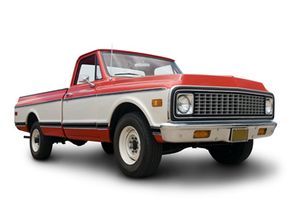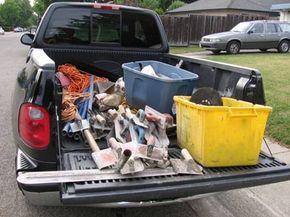Once you've finally splurged to buy that boat you've always wanted, it may strike you that it's not so smart to lug it around with the old family sedan. Maybe it's time to upgrade to a truck. The question is, "What kind?" Soon after you begin your search, you'll realize that shopping for the right truck can get confusing. When it comes to heavy duty towing and hauling, it's easy to get lost in the sea of terms and safety requirements. The real meaning of "half-ton" pickup, for instance, eludes some automotive folks, let alone first-time truck buyers.
A ton is 2000 pounds (907.19 kg), so does it follow that a half-ton truck weighs 1000 pounds (453.5 kg)? Actually, the name doesn't refer to the weight of the truck. In fact, half-ton pickups weigh much more than that. The weight of a truck without cargo or passengers is called the curb weight. For example, many 2007 half-ton pickups have curb weights between 9000 (4082.3 kg) and 11000 (4989.5 kg) pounds [source: Edmunds].
Advertisement
The "half-ton" description loosely refers to the truck's payload capacity. This means that the truck can carry up to 1000 pounds (453.5 kg) of cargo and passengers in the cab and bed. But wait a minute: If you take a look at the stats on modern half-ton pickups, you'll notice that their payload capacities exceed 1000 pounds (453.5 kg). Although early half-ton pickups could carry max loads of 1000 pounds (453.5 kg), since at least the 1960s, new and improved half-ton pickups have been able to safely carry more, surpassing their namesakes [source: Autotropolis].
But old habits die hard, and the name "half-ton" has stuck around to this day. It's still helpful as a general classification term, differentiating the group from the larger, heavy-duty three-quarter-ton pickups and one-ton pickups (also obsolete terms). A better way to find out the maximum payload capacity is to check the individual truck's specs online or in the owner's manual to see what the manufacturer recommends.
So, don't skip over half-tons because you think you need more capacity -- this name contradicts their real hauling power. Consumer Reports actually warns against buying a truck with more hauling capacity than you need because its higher-capacity suspension will make for a more uncomfortable ride [source: Consumer Reports]. It's also important to note that payload capacity isn't the same thing as towing capacity, which you'll need to consider if you plan to haul a boat or trailer.
Advertisement

